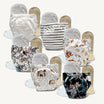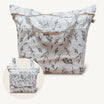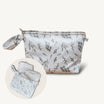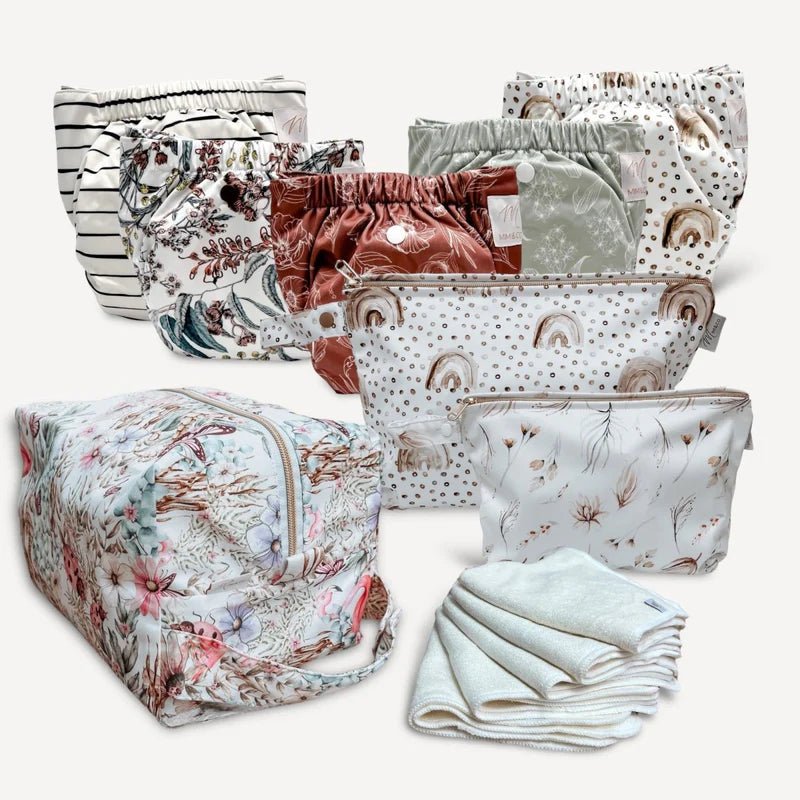Experiencing leaks with cloth nappies at night is a common issue for many parents. Even with the best efforts, leaks can still happen. Here are the key things to check to ensure you're on the right track and identify why your night nappy might be leaking.
1. Are the Inserts Completely Saturated?
One of the first things to check is whether the inserts are fully saturated. When you remove the nappy, inspect the inserts. Are there dry spots, or is only half of the insert wet while the rest remains dry?

If the inserts are not fully saturated, two main factors could be contributing to this:
The Fit of the Nappy
The fit of the nappy is crucial in ensuring your baby stays comfortable and dry. Leaks can occur due to gaps between the nappy and your baby's legs and waist. Ensure the frills on bamboo fitted night nappies are properly tucked in, and check that the nappy isn't sitting too low or too high. A nappy that is too tight or too loose can also cause leaks.
2. Flooding
If you're confident that the fit isn't the issue and the inserts aren't fully saturated, your baby might be flooding the nappy. Flooding occurs when your baby releases a large amount of urine at once, overwhelming the nappy's absorption capacity. This happens because the stay-dry layer inside the nappy isn't quick enough to absorb the rapid flow, causing leaks out the sides.
In this case, the inserts will not be fully saturated because the urine doesn't have enough time to be absorbed into the layers before leaking out. To address this, place a fast-absorbing material, such as a folded cotton face washer, between your baby and the nappy. This will quickly absorb the urine and give the inserts time to soak up the moisture.

3. Insufficient Absorbency
If your inserts are completely saturated and you're still experiencing leaks, it means you don't have enough absorbency for your baby's needs. You have two options:
Increase Absorbency
To get more time out of the nappy, add extra inserts or boosters to increase the absorbency. This is especially important for overnight use when you want to avoid waking your baby for a nappy change.
Change More Frequently
Alternatively, change your baby more often than usual. However, for nighttime, adding more absorbency is generally recommended as most babies don't soil their nappies overnight, and uninterrupted sleep is preferable.
Navigating the challenges of nighttime cloth nappy leaks can feel overwhelming, but with the right approach, you can find a solution that works for both you and your baby. Remember that occasional leaks are a normal part of using cloth nappies, and it's important to stay patient and persistent. By examining whether your inserts are fully saturated, ensuring the nappy fits correctly, and addressing potential flooding issues, you can significantly reduce the chances of leaks.
Moreover, increasing the absorbency of your nappies or adjusting the frequency of changes can provide the additional protection needed for a leak-free night. Every baby is different, and finding the perfect combination of fit and absorbency might take some trial and error. However, the benefits of using cloth nappies—such as reduced environmental impact, cost savings, and comfort for your baby—make it worth the effort.
Investing time in understanding the nuances of cloth nappy use will pay off in the long run, resulting in more restful nights for both you and your little one. If you ever feel stuck or need further advice, don't hesitate to reach out to other cloth nappy users or consult resources from trusted cloth nappy brands. With the right knowledge and adjustments, you'll be well on your way to mastering nighttime cloth nappy use and enjoying the many benefits it offers.



![Reusable Bamboo Wipes [5 Pack] - Mimi & Co](http://mimiandco.com.au/cdn/shop/files/reusable-bamboo-wipes-5-pack-159364.jpg?v=1744260023)














![Lanolin 100g [PREORDER] - Mimi & Co](http://mimiandco.com.au/cdn/shop/files/lanolin-100g-preorder-503357.jpg?v=1724197456&width=104)



![Reversible Nappy Pods [PREORDER] - Mimi & Co](http://mimiandco.com.au/cdn/shop/files/reversible-nappy-pods-preorder-222615.jpg?v=1711157289&width=104)







![Reusable Bamboo Wipes [5 Pack] - Mimi & Co](http://mimiandco.com.au/cdn/shop/files/reusable-bamboo-wipes-5-pack-550052.jpg?v=1744306723&width=104)





















Leave a comment
All comments are moderated before being published.
This site is protected by hCaptcha and the hCaptcha Privacy Policy and Terms of Service apply.